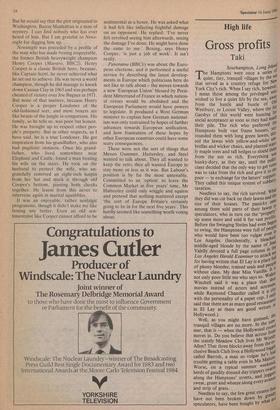But he would say that the plot originated in Washington.
Baron Manhattan is a man of mystery. I can find nobody who has ever heard of him. But I am grateful to News- night for digging him up.
Newsnight was preceded by a profile of the man who has made boxing respectable, the former British heavyweight champion Henry Cooper (Maestro, BBC2). Henry Cooper is a classic British hero, because, like Captain Scott, he never achieved what he set out to achieve. He was never a world champion, though he did manage to knock down Cassius Clay in 1963 and was perhaps cheated of victory over Joe Bugner in 1971. But none of that matters, because Henry Cooper is a proper Londoner of the old-fashioned sort, and most boxers are like beasts of the jungle in comparison. His family, so he tells us, was poor but honest. He was brought up to respect other peo- ple's property. But in other respects, as I have said, he is a true Londoner. He got inspiration from his grandfather, who also had pugilistic instincts. Once his grand- father, who lived somewhere near Elephant and Castle, found a man beating his wife on the stairs. He took on the husband to protect the wife, who un- gratefully removed an eight-inch hatpin from her hat and stuck it through old Cooper's bottom, pinning both cheeks together. He learnt from this never to intervene again in marital squabbles.
It was an enjoyable, rather nostalgic programme, though it didn't make me like boxing any better. Even an old sen- timentalist like Cooper cannot afford to be sentimental as a boxer. He was asked what it had felt like inflicting frightful damage on an opponent. He replied: 'I've never felt revolted seeing him afterwards, seeing the damage I've done. He might have done the same to me.' Boxing, says Henry Cooper, 'is just a job of work'. It isn't really.
Panorama (BBC1) was about the Euro- pean elections, and it performed a useful service by describing the latest develop- ments in Europe which politicians here do not like to talk about – the moves towards a new 'European Union' blessed by Presi- dent Mitterrand of France in which nation- al vetoes would be abolished and the European Parliament would have powers to legislate. It produced a West German minister to explain how German national- ism was only restrained by hopes of further advances towards European unification, and how frustration of these hopes by ' other European countries could have some scary consequences.
These were not the sort of things that Messrs Gummer, Hattersley, and Steel wanted to talk about. They all wanted to keep the veto; they all wanted Europe to stay more or less as it was. But Labour's position is by far the most untenable. Committed to an 'option' to leave the Common Market in five years' time, Mr Hattersley could only wriggle and squirm and pretend that nothing mattered except `the sort of Europe Britain's certainly going to be in for the next five years'. This hardly seemed like something worth voting about.












































 Previous page
Previous page